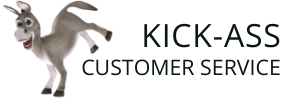Beware of the Curse of Knowledge in Customer Service
In customer service, the curse of knowledge can create catastrophic consequences.
We’re all cursed. And we’re not talking about the curse that our parents bestow on us: “I hope when you grow up you have kids who act just the way you do!” (Incidentally, that curse works!) No, we’re talking about another type of curse that insidiously infects customer service personnel, as well as supervisors, managers, and business owners.
So, what is this curse that can catastrophically wreck havoc on the quality of our customer service?
It’s the curse of knowledge; indeed, the greater our knowledge, the more we are cursed.
Before we get into the specifics, let’s review an example of the curse of knowledge. You may recall from an earlier post – or from one of my presentations – business guru Tom Peters’ discussion of research revealing the average amount of time before a physician interrupts a patient during an office visit, which is a mere 18 seconds. In other words, on average, only 18 seconds elapse before a physician interrupts a patient and begins interjecting his or her diagnosis of the patient’s condition during the initial phase of the office visit.
Tom Peters’ point is this: when a patient presents him- or herself to a physician, the best source of information about the patient’s ailment is the patient. Despite this obvious fact, the physician, likely having heard similar descriptions from other patients “hundreds of times before,” combined with the physician’s specialized knowledge of medicine, often “jumps to a conclusion” prior to the patient fully explaining his or her ailment. Sometimes, the physician is correct, but other times, the physician might be wrong, which may have devastating consequences.
To be fair, Tom Peters doesn’t use this example to “pick on” physicians; rather, he uses the example to “pick on” all of us, especially leaders, such as customer service leaders.
In sum, the curse of knowledge leads to three potentially catastrophic customer service practices.
- First, because we’ve “heard the customer’s story hundreds of times before,” we interrupt the customer, which is not only inappropriate, but also rude.
- Second, because we’ve interrupted the customer, we create a genuine risk of depriving ourselves of additional information that might prove helpful in resolving the customer’s issue. Often, this increases the frustration level of everyone, especially the customer.
- Third, we convey impatience: even though we’ve “heard the customer’s story hundreds of times before,” remember that this is the first time this particular customer has explained his or her situation to us. It is for this reason that Disney cast members are specifically trained to respond enthusiastically to the question “Where is the nearest restroom?” even though they are asked that same question hundreds of times each day.
And, as we mentioned before, there is a correlation between the degree of our knowledge and the severity of the curse: the greater our knowledge, the more severe the curse.
This week, take a moment to discuss the curse of knowledge, together with its implications, with your team. Specifically, be sure that your team members are trained to:
- listen patiently to the customer, without interrupting, despite having “heard the customer’s story hundreds of times before”; and
- avoid “jumping to conclusions” about the customer’s issue, especially while the customer is still explaining his or her situation.
You’ll find that being aware of the curse of knowledge will not only minimize everyone’s frustration level, but will also contribute to a higher quality of customer service.
Have a “customerific” week!
Mark
